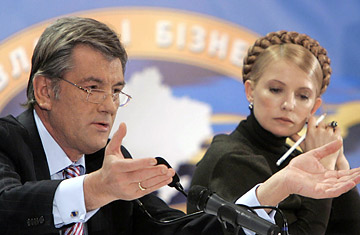
Ukrainian President Viktor Yushchenko and the Prime Minister of Ukraine Yulia Tymoshenko
Vice President Dick Cheney arrived in Ukraine Thursday to bolster its pro-Western government in the wake of the Georgia debacle, but he's unlikely to save it from collapse. The mortal threat to the administration of President Victor Yushchenko comes not from Russia, but from Prime Minister Yuliya Tymoshenko, his arch-rival for leadership in the democratic coalition that swept to power in 2005. And whereas Yuschenko has rallied to the Georgian cause and reiterated his own desire to accelerate Ukraine's entry into NATO, Tymoshenko is seen to be more willing to accommodate Russian concerns, and is seeking to oust the president by making common cause with the main opposition party traditionally endorsed by Moscow.
Yushchenko and Tymoshenko had jostled for power since the "Orange Revolution" in which their coalition broke the grip on power of the Moscow-endorsed Party of the Regions (PR) led by Victor Yanukovych. Although the president had previously fired her, he was forced to reinstate her as Prime Minister after the 2007 elections, in which Tymoshenko's party far out-polled his own. But the truce was fragile, and broke down this week in a political crisis triggered by the Russia-Georgia war, but far longer in the making. While Yushchenko had adamantly supported Georgian President Mikheil Saakashvili (of whose son he is the godfather) and stressed the urgency of Ukraine joining NATO to protect itself from Russian aggression, Tymoshenko was pulling in a different direction. She moved through eastern Ukraine's Russian-speaking regions — the political heartland of Yanukovych — promising that under her leadership, Ukraine would never be dragged into any conflict among other countries.
Informed sources in both Moscow and Kiev have told TIME that Tymoshenko has reached a deal with the Kremlin, under which she would be more considerate of Russia's needs — particularly for long-term rights to its Black Sea naval base at Sevastopol — and would tone down her traditional anti-Moscow diatribes, and in return she may find Russia more flexible when it comes to negotiating next year's prices for the natural gas on which Ukraine depends. However, Tymoshenko firmly denies rumors of any accommodation with foreign powers, insisting that she abides only by the interests of Ukraine.
Rumors of a Tymoshenko deal with Moscow and the rift over Georgia among the Ukraine's political elite ignited the latest firestorm in the long-running power struggle. On Wednesday, Tymoshenko's party sided with =Yanukovych's and the Communists in several parliamentary votes that transferred a number of executive powers from the presidency to the office of prime minister. The powers lost by Yuschenko include the right to dismiss the Defense, Interior and Foreign Ministers, as well as control over the counter-intelligence service. The Tymoshenko-Yanukovych alliance, which created a veto-proof marriage of convenience, also simplified legislation on presidential impeachment.
"Today, a political and constitutional coup began in the parliament," Yuschchenko fumed on Wednesday, warning that he would use his right to disband the legislature unless a new coalition is formed within 30 days.
Tymoshenko shot back in her own televised address, accusing Yushchenko of sabotaging the coalition and her government for the purpose of scoring political points in his re-election campaign. She also refuted claims that she was soft in her support for Georgia, saying: "My position on Georgia is in line with the European Union, and it is not to drag Ukraine into conflicts."
Right now, Tymoshenko holds the aces among the former "Orange" electorate. In the event of a snap election, there's little doubt that she would again defeat Yushchenko. Polls show her in second place in a close-fought race with Yanukovych, with President Yushchenko trailing in a distant third place. And she will have a very strong chance to rally against Yanukovych by the 2010 presidential election, with many Ukrainians still fuming over his Russian-backed efforts to fraudulently claim victory in 2004.
She may have backed away from Yuschenko's tough line on Georgia, but Tymoshenko could be playing a smart tactical game. She'll use Cheney's visit to strengthen her ties with the U.S. even as she hews to the cautious E.U. line on Georgia, hoping to extract a more favorable natural gas deal from Russia in exchange for her moderate position. Ukraine, after all, is a vulnerable country, and one of its old peasant sayings has it that "a tender calf suckles two cows."
